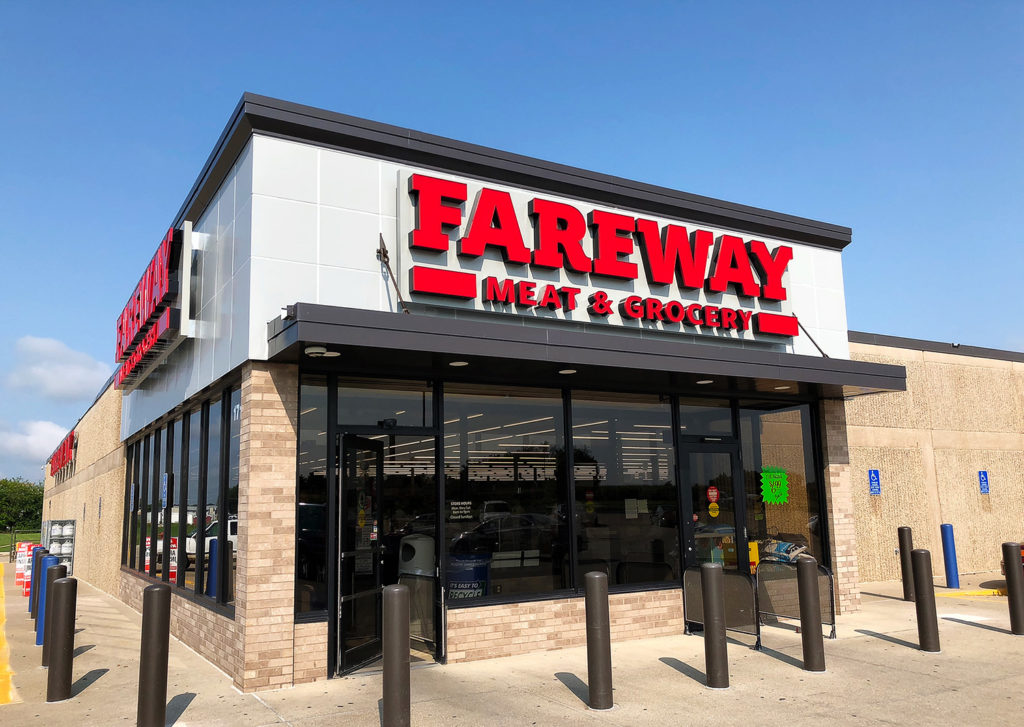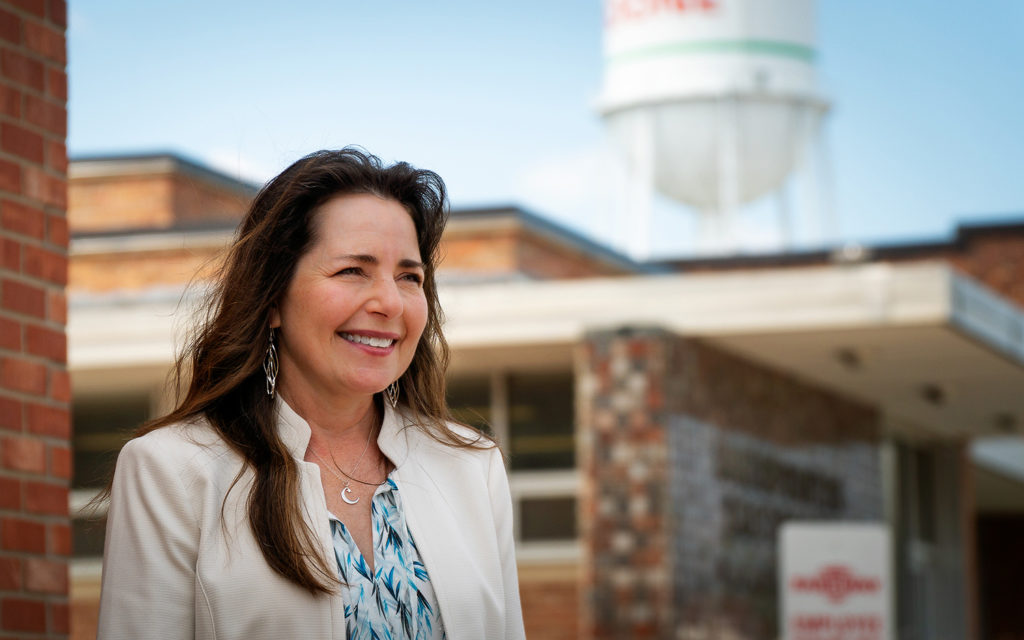
Lisa Kerns
As Fareway’s first CIO, Lisa is helping the traditional grocery retailer adapt in a rapidly changing and increasingly competitive landscape dominated by big chains and Amazon. The former aerospace engineer and software developer believes building lean IT teams and leveraging technology strategically will be key in evolving the brand while maintaining customer loyalty.
Can you describe the path you took to where you are now?
I suppose it’s a pretty typical path of a lot of people in technology. In high school, computers were kind of a brand-new thing entering the schools, and I got involved in some really cool classes there, programming on these little Apple computers.
When I went to college (at Northern Illinois), there were programs in computer science. I took a little bit of a different route, though; instead of being a computer science undergrad, I went into a very specialized manufacturing engineering career with computerized machine tools. After graduating, I moved from Chicago, where I grew up, out to Cincinnati to work at GE, where I helped build aircraft engines. That’s a really cool industry, but it’s also a tough industry to stay employed in, because aerospace tends to go up and down depending on the economy or the political party that’s in office, as it relates to military spending.
Gradually, I got out of the aerospace field and more into software development, working with small companies in the dot com era. Eventually, I came to work on retail systems, which has been my favorite industry. I’ve been in retail over a decade now, and I really love it.
Why is retail your favorite industry?
I think it’s because I like to think about technology as solving a business problem, and as a consumer I get to play both sides of the fence. I can be a technologist during the day and recommend strategies and technologies to the company, but then I also get to shop at the store, put myself in the customer’s shoes to understand how they feel. We have a really broad customer base at Fareway, and I love working in technology that touches a lot of people’s daily lives. There’s also a lot of showmanship in retail; it’s pretty and fancy. We have merchandising, marketing, all of those things that I like to get involved in as well.

We have a really broad customer base at Fareway, and I love working in technology that touches a lot of people’s daily lives.
Was there an aha moment when you realized that tech was your passion?
I don’t know that there was necessarily an aha moment. I was always really into the sciences. I was terrible at math, though. I had to work very hard at math. But with computers, my mind just kind of thought that way, and it was a natural thing that I was good at.
It was also new. Back in high school, computers were this emerging thing, and everyone was trying to figure it out — the teachers, the students. It was something no one had really done before, and I think that’s what excited me about it. I took lots of classes, even in college, where it was pretty clear that the instructors didn’t know what they were doing and we all had to figure it out together.
I would say a bigger aha moment was when I started to work in industries that had much more of a dependency on “regular people” as their customers. We weren’t selling jet engines to China; it was about trying to sell a shirt to my neighbor or groceries to my friends. That was big for me, the fact that I could work in an industry where I could understand what people were thinking and what they wanted, and work with companies to figure out how to best address those needs. That was the really exciting part for me, the fact that I can do that in technology and work in retail on the business side.
How do tech and retail intersect?
If we talk about grocery, it’s gotten really crazy in the past several years. There’s a huge war going on between Kroger and Amazon, and Walmart, to a lesser extent. As a result, those companies are pushing tech out as fast as they possibly can to see who can win that war, and that’s having an effect on everyone else. Fareway is a small regional player in that war, but it trickles down to all the brands.
How does a rapidly changing retail landscape impact your goals and priorities at Fareway?
It requires skill sets that are highly adaptable. That’s probably the number one thing I look for on my teams when we’re hiring. I’m always considering, do we have the ability to change priorities rapidly and do a lot of things at once? Because we may have done a lot of planning and roadmapping for the year, but that doesn’t mean that midway through the year the whole thing won’t move around and change
The other thing that’s true for retail, and grocery is no exception, is that we’re selling lots of products very quickly. It’s different than building an airplane: airplanes fall out of the sky if everything isn’t perfect. But a mobile shopping app can be a little bumpy when it goes out the door and it’s okay, because there isn’t a plane that’s going to fall out of the sky. In retail it’s okay to not have everything polished and perfect. The point is to get it out the door so customers can use it. It’s also important to try and fail quickly. Try things, see if they work, pilot it in one store. It doesn’t have to be the whole chain or every single store.

I’m exceptionally focused on the end business value statement — if I can create better revenue opportunities through technology, get closer to the customer, this is where technology really adds value.
What’s a typical day like as CIO?
I’m the first CIO Fareway has had, so we’re kind of making it up as we go. I’m maybe a little different as a CIO, too, because I’m exceptionally focused on the end business value statement — if I can create better revenue opportunities through technology, get closer to the customer, this is where technology really adds value. Of course, we like to keep costs down and be effective and efficient. But the real bang for the buck is, how can we deliver value and be incredibly flexible, nimble, and adaptable?
I oversee all of the technology teams that support our in-house applications, our warehouse applications, infrastructure, and store networks, as well as all of the stores’ POS equipment and scales, and all the tech that goes into our stores. All of that is part of my universe. But I spend most of my time working with the executives to figure out what our portfolio should be for the next couple years, and how we can transform the business to deliver some of the things consumers have been asking for.
What are some of the things customers are asking for?
It’s the obvious things — a better mobile shopping experience, more coupons, offers that are personalized for them. They’re saying things like, “If I share my identity with you and you can see what I buy, you should be able to present offers that make sense for me. Don’t offer me pet food when I don’t have a pet; don’t offer me baby products when I don’t have a baby. Show me deals for things I love in the categories that I like to shop.”
E-commerce is another thing that we’re looking very hard at — being able to order groceries online and pick them up at the store. We’re also looking at self checkout, which is pretty mainstream. Then there are some cutting-edge things that not everyone is doing, like some unique uses of electronic shelf labels.
What types of challenges do you encounter in the retail tech space?
One thing that’s been particularly vexing is this idea around the mobile application. All day long, my inbox fills with emails from companies who want to pitch me a little bit of consumer capability. But they want to attach it to a mobile app — their mobile app. Some of these have really cool capabilities, but I can’t have a separate app for each feature. It all needs to be able to fit into the singular Fareway app.
That’s a little bit of a limitation of mobile technology today, how it’s containerized. When it comes to the customer experience, I might want to have online ordering, kiosk ordering in the deli, a meal planning service, and lots of other things — but I can’t ask people to download twenty apps to do that. So for all the startups out there that want to pitch to retailers: if your idea is predicated on using your app for that little bit of technology, it’s probably a nonstarter. Because nobody’s going to download a hundred different apps; it’s not a viable option.
I think as a whole, our brand is starting to change, too. We’ve been known for being traditional in many ways, but we recognize that consumers have different tastes and preferences than they did ten or twenty or thirty years ago. We want to do some things that are a little bit more mainstream that we want to catch up on, but there are lots of other things we can do that maybe no one else is doing for different reasons.
I think the pace of change is hard in the beginning. If you haven’t done a lot, it’s hard to take that first step and do things. But once you do it, the next step gets easier, and easier, and easier. So if there’s anything I would say about my role here, it’s to help accelerate change. Not just in the business, but in the people. Try to speed up that rate of change so we can do more. It’s not just on the technology side and the consumer side; it’s on the marketing side, the merchandising side, in our product lines, product packaging — everywhere.
How has your education helped you get to where you are today?
I have an undergraduate degree, as I mentioned, and I also have two masters degrees — an MBA and an MIS degree, both from the University of Cincinnati. I really encourage people in IT to get their MBA. If you want to get into a senior leadership level, whether that’s inside IT or not, you have to be able to speak the language of your peers. That doesn’t mean talking endlessly about routers and switches; it’s about the basics of business: Do you know how to create a budget and a strategy? Do you understand marketing? How about customer experience? An MBA is a really great way to get exposure to all of those areas, to get up to speed on how to run a business and how to participate at the executive level in those discussions. You can pick that up through exposure to various things in your company, but an MBA is a fast way to get there.
What’s the biggest risk you’ve taken in your career?
I’ve definitely worked for a lot of organizations that I knew were in a transformative state, whether it’s a brand that needs a lot of help because they haven’t invested in core technologies or a startup that may or may not make it off the ground. I’ve done startups inside of larger companies as well, which is something that’s sort of cool to do. I tend to like roles that are a challenge, where people are different from when I start to further on down the line when we’ve accomplished our goals. For me, it’s easier to take risks in a good job market; but if you’re afraid to take risks, particularly at the executive level — and especially in retail — you’re probably in the wrong industry.
For me, it’s easier to take risks in a good job market; but if you’re afraid to take risks, particularly at the executive level — and especially in retail — you’re probably in the wrong industry.
Talk to us a bit about your leadership style and how that drives your team’s production.
I would say my style is definitely collaborative. I’m very focused on our business goals and trying to help people understand priorities. We might have particular goals or principles in IT, and those are based on where our business wants or needs to go. It’s different at every company: Some companies have a desperate need for standardization — they’re large, they operate multi-country, and nobody knows what anyone else is doing. And some companies really need to focus on strategy.
So a lot of what I do is, if there isn’t a strategy for the company, I try to help put one on paper, and I make sure that the IT portfolio is addressing those goals. Then everyone in IT gets to see the portfolio, and they get to see how what they’re working on helps contribute to those corporate goals. That to me is probably the single greatest bit of leadership: being transparent, exposing as much as I possibly can about what we’re going through as an organization, what’s important to leaders, what’s important to consumers, and maybe even where there are conflicts or gaps.
I’m also very big on everyone having a piece of ownership in their individual area. I’m kind of well known in the industry for running very large companies on very tiny teams. I’m not here to build an IT empire. In order to do that, the secret is leveraging a lot of cloud applications, where we don’t need an army to build something in a data center. That also makes us more adaptable, because we can grab cloud technology and implement it very fast. And then turn it off just as fast if it doesn’t work.
As a result, we need people who can do much more than just write software: we need people who know vender management, who can do project management, who can figure out what the strategy should be for their area. So if they own networking, what tools, technologies, and vendors are we going to use? What kind of budget do we need? What kind of staffing? You need to have lots of high-performing people who are skilled in lots of different areas to run IT that way. So that’s kind of my style, to develop organizations that can run really lean but with a high degree of ownership.
Have you had any mentors along your path?
I’ve had a lot of mentors. Some of the best mentors I’ve had have actually been the accidental ones that probably didn’t mean to be. I learned from their mistakes as well as their successes, and I also learned that just because something worked for one person doesn’t mean it’s going to work for someone else — or for me. You have to find your own way. But I’ve definitely had some great people who were really invested in my success, who helped me one way or another to get where I am. I think that’s part of leadership, figuring out people’s strengths around you.
Fareway is based in Boone, a rural community in central Iowa. How do you envision we continue inclusion efforts for women, minorities, and rural Iowans in our state?
An interesting thing is, I hear a lot of excuses from lots of companies I’ve worked with. They say, “Darn it, we just don’t seem to get résumés from these people.” That’s probably true, and there are probably reasons why. It could be the language, how you’re writing the job description — that has kind of a subconscious effect when people look at the ad. Certainly, if they don’t see people who look like them in the stores or in the jobs, they are less likely to think it’s the right fit for them.
You have to really put in an effort. That means not just waiting to see what résumés come in. It takes more targeted recruiting, more focused recruiting. I think Iowa has a great story — low unemployment, low cost of living, beautiful area — and I think that long-term the goal is to attract more industry and more companies here.
I keep telling people, Des Moines is the new Austin. We have some startups and incubators, and I hope to see some more growth in the industry. People are very curious, and very open. And generally, people want to work together, and that’s great. It helps everyone move forward. But in terms of having a more diverse workforce, we can do it. We just need to put more effort into it.

From your perspective, what needs to happen to create more access for women in executive technology roles?
This goes back to that idea that if you see people that look like you in a company, then it’s not so strange to think that you would be a good fit in a particular role. Having more women in tech roles now attracts more women in the future. I think companies that struggle with this may or may not have many women in the pipeline. Even if they made a conscious effort to say, “let’s balance our boards, let’s balance our executive level,” you have to consider if there are women ready to take that step. This could be a little bit of a challenge, but we have to work on the pipeline. What are we doing to develop women at the companies that we’re with? What are we doing to develop the next generation of women and get them to see us? So, for me, I do things like this. This interview. Being as visible as possible. I can’t explain why there aren’t more women at the executive level in these roles, but the more of us who get here, the more who will follow.
Can you talk about the kinds of strategies Fareway is implementing to address workforce shortage issues, specifically in tech roles?
We don’t have a lot of tech roles open right now. As I said, we’re a very lean organization. Interestingly enough, the technology group is probably one of the more diverse groups in Fareway. Even prior to me being here, the team did a great job in that regard. In some ways, tech in and of itself is very diverse. There shouldn’t really be as big of a problem as companies have experienced. You just have to be sure you’re not influencing the hiring decisions with an unconscious bias yourself. We do put in an effort, and we look for diverse candidates. I think that’s been a benefit overall for the success of our team.
What advice would you give a young person considering tech or a person looking to transition into a tech career?
If it’s what you want, if it’s your passion, then go for it. I don’t think you have to have huge technology degrees. Certifications are great, but they only go so far. Getting the right opportunities is best. Just get in there and do it. The other thing is that you don’t have to do it for your whole life. No one is going to make you pick a career and work at that same company for forty years. It’s great if you find that and you love that, but it’s totally up to you. I think for a lot of us who started in tech, we’ve migrated to lots of different places. The world has so much tech in it that it’s a great place to start, and you can always branch out from there.
What are you passionate about outside of work?
I like to build things. I like to be outside and do all kinds of outside things. I like construction, too, buying houses that are wrecks and trying to fix them. If I had to do it all over again, I might have actually become a building architect instead of a technology architect. I have a little 500-square-foot bungalow in Boone, and I enjoy working on that in my spare time.
What kind of legacy do you want to leave?
I won’t be around forever, none of us are going to be around forever. We need to figure out how we’re going to get the next generation of leadership and tech employees where they need to go, to be able to take over after us and do a better job than we did. Whether that’s people leaders or functional leaders, I wonder, what have we done to improve the lives of those we work with? How have we improved the lives of our customers? As much as anything, it’s about consciously thinking about who’s going to replace you. And making sure that they’re ready to do that.
I think for a lot of us who started in tech, we’ve migrated to lots of different places. The world has so much tech in it that it’s a great place to start, and you can always branch out from there.

